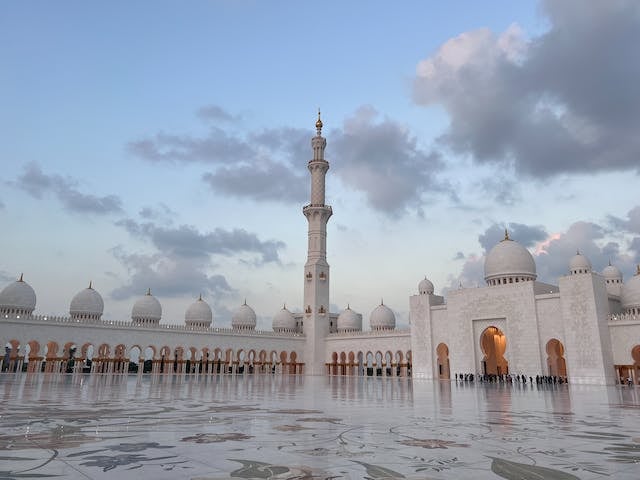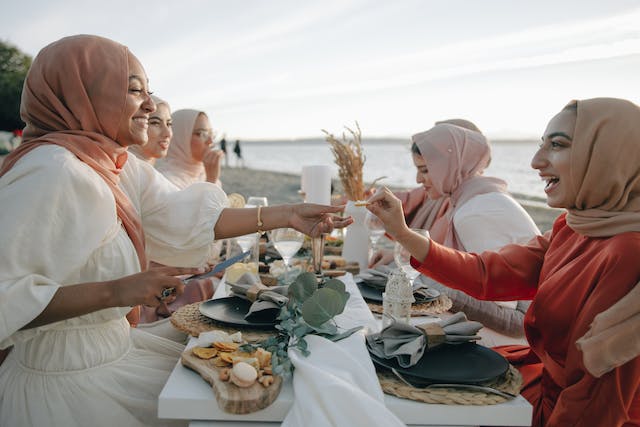Basic Arabic Phrases for Travel
Are you travelling to an Arabic-speaking destination soon? Immerse yourself in the local culture and enhance your travel experience with these indispensable Arabic phrases for travel.
From basic greetings to navigating local markets, this list of Arabic phrases will equip you with the linguistic tools to connect with locals and make your journey truly unforgettable.
→Sign Up Now: Free Trial Arabic Lesson With a Native Teacher!←
Basic Arabic Greetings
- As-salamu alaykum (السلام عليكم): “Peace be upon you.” This is one of the most common Arabic phrases.
- Wa alaykum as-salam (وعليكم السلام): “And upon you be peace.” This is how you’re expected to respond.
- Marhaban (مرحباً): A generic “Hello”, also meaning “Welcome.”
- Kaif halak? (كيف حالك؟): How are you?
- Sabah al-khayr (صباح الخير): Good morning.
- Sabah an-nuur (صباح النور): “Morning of light”. Another way of saying “Good morning”.
- Masa’ al-khayr (مساء الخير): Good evening.
- Tusbih ala khayr (تصبح على خير): Good night.
- Alhamdulillah (الحمد لله): “Praise be to Allah.” This expression is said in various contexts, including: after sneezing, at the beginning and end of a difficult task, when you want to show gratitude, to express contentment.
Arabic for Travel: Phrases to Help You Get By
Food-related Arabic Phrases:
- Tawilah li ithnayn, min fadlik (طاولة لاثنين، من فضلك): A table for two, please.
- Ana jahiz li al-talab (أنا جاهز للطلب): We are ready to order.
- Shu ‘ajmal wajib indakum? (شو أجمل وجبة عندكم؟): What’s your best dish?
- Ayna al-mayyisat? (أين المياه؟): Where’s the restroom?
- Alhisab, min fadlik (الحساب، من فضلك): The bill, please.
Arabic Phrases for Shopping:
- Bikam hatha? (بكم هذا؟): How much is this?
- Hal ‘indakum tasawwur? (هل عندكم تصوّر؟): Do you have a fitting room?
- Hal yuwjad tawfiqat? (هل يوجد توفيقات؟): Are there discounts?
- Hal ‘indakum tasleem? (هل عندكم تسليم؟): Do you offer delivery?
- Sa’khudh hatha (سأخذ هذا): I’ll take this.
- An taa’tiyya li fatura, min fadlik (أن تعطيني الفاتورة، من فضلك): Please give me the receipt.
Asking for Directions in Arabic:
- Ayna almatar? (أين المطار؟): Where is the airport?
- Kaifa ashab al-bis? (كيف أصل إلى البحر؟): How do I get to the beach?
- Ayna ajidu alفtaaj? (أين أجد الفندق؟): Where can I find the hotel?
- Hal hunak mahat alautubis? (هل هناك محطة الأتوبيس؟): Is there a bus station here?
- Kaifa ashab al-Muaskar? (كيف أصل إلى المستشفى؟): How do I get to the hospital?
- Ayna ajidu suk al-at’ima? (أين أجد سوق الأطعمة؟): Where can I find the food market?
- Kaifa ashab ila al-mall? (كيف أصل إلى المول؟): How do I get to the mall?
Asking for Help in Arabic:
- Mumkin mosa’adah, min fadlik? (ممكن مساعدة، من فضلك؟): Can you help me, please?
- Hal tatakallam Injlezi? (هل تتكلم إنجليزي؟): Do you speak English?
- Mumkin tafhamni? (ممكن تفهمني؟): Can you understand me?
- Mumkin turaahni ila al-mustashfa? (ممكن ترشيني إلى المستشفى؟): Can you take me to the hospital?
- Hal yuwjad internet huna? (هل يوجد إنترنت هنا؟): Is there internet here?
- Hal tatawaffaq al-dawrat? (هل تتوفر الدورات؟): Are there restrooms available?
- Mumkin ashtari shawaya? (ممكن أستخدم شوية؟): Can I use your phone?
Arabic Phrases for Socializing
Arabic Phrases to Show Interest:
- Shu wazifatak? (شو وظيفتك؟): What’s your job?
- Hal ‘indak a’ila kabeera? (هل عندك عائلة كبيرة؟): Do you have a big family?
- Min ayna anta/anti? (من أين أنت؟): Where are you from?
- Hal tihubu al-`aysh huna? (هل تحب العيش هنا؟): Do you like living here?
- Masha’Allah (ما شاء الله): This expression means “What Allah has willed” and is used to compliment something or someone.
- Kayfa kana yomak? (كيف كان يومك؟): How was your day?
- Shu asma’ minnak? (شو أسمع منك؟): What’s new with you?
- Hal tatakallam lugha ukhra? (هل تتكلم لغة أخرى؟): Do you speak another language?
Talking about yourself in Arabic
- Ana min (أنا من): I am from…
- Ana Talib/Talibah (أنا طالب/طالبة): I am a student (for males/females).
- Ana ‘oheb (أنا أحب): I love…
- Fi wakti alfaragh, ‘ohib (في وقت الفراغ، أحب): In my free time, I like…
- Ana min hawaa makanat jamila (أنا من حواء مكانات جميلة): I come from a beautiful place.
- Ana mutazawwij/mutazawwija (أنا متزوج/متزوجة): I’m married.
- Ana ‘a’zel (أنا عازب): I’m single.
- Ana ‘amal ka… (أنا عامل كـ): I work as a…
- Ana huna li shu’ub (أنا هنا لشؤون العمل): I’m here on business.
Arabic for Traveling: FAQs

What are the 22 countries that speak Arabic?
Arabic is spoken across 22 countries in the Arab world. These countries include: Algeria, Bahrain, Comoros, Djibouti. Egypt, Iraq, Jordan, Kuwait, Lebanon, Libya, Mauritania, Morocco, Oman, Palestinian Territories, Qatar, Saudi Arabia, Somalia, Sudan, Syria, Tunisia, United Arab Emirates, Yemen
What is the meaning of Yalla in Arabic?
“Yalla” is an Arabic expression that is commonly used across the Arab world. It translates to “Let’s go” or “Come on” in English. It is a versatile phrase used to encourage action or to hurry someone up.
Is Arabic hard for English speakers?
Arabic can be considered a challenging language for English speakers due to its unique script (Arabic script), complex grammar, and the presence of sounds that may not exist in English. However, with dedication, consistent practice, and effective learning methods, it is certainly possible for English speakers to learn and become proficient in Arabic.
Is it worthwhile to learn Arabic?
Yes, learning Arabic is highly worthwhile for several reasons:
Cultural Understanding: Arabic is not just a language; it opens the door to a rich and diverse culture. Understanding Arabic helps you appreciate literature, art, music, and traditions from the Arab world.
Professional Opportunities: With the increasing global importance of the Middle East, knowing Arabic can be an asset in various professional fields, including business, diplomacy, journalism, and academia.
Travel: If you plan to travel to Arabic-speaking countries, knowing the language enhances your travel experience by enabling better communication with locals and a deeper understanding of the culture.
Intellectual Challenge: Learning Arabic is a mental exercise that challenges and stimulates your cognitive abilities. It broadens your perspective and enhances linguistic skills.
Beyond Arabic Phrases for Tourists: Learn Arabic Now
Now that you have explored some frequently asked questions about Arabic, you might be intrigued by the depth and richness of this language. Whether you are drawn to the diverse cultures of the Arab world, seeking professional opportunities, or planning a journey to an Arabic-speaking country, embarking on a journey to learn Arabic is a rewarding endeavour.
→Sign Up Now: Free Trial Arabic Lesson With a Native Teacher!←
At Language Trainers, we understand the challenges and excitement of learning a new language. For more than 20 years, our experienced Arabic instructors have guided learners from all over the world through the intricacies of Arabic, making the learning process enjoyable and effective. With tailored lessons, cultural insights, and a supportive learning environment, you’ll find yourself progressing confidently.
So, are you ready to dive into the beauty of Arabic language and culture? Join us at Language Trainers and embark on a journey that goes beyond words. Take an in-person Arabic course in Toronto or contact us visit or contact us now to ask us about other cities.

